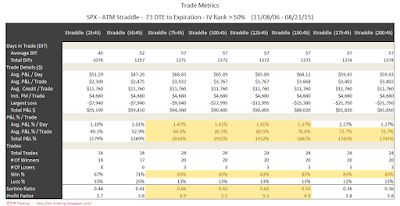For background on the setup for the backtests, as well as the nomenclature used in the charts and tables below, please see the introductory article for this series: Option Straddle Series - P&L Exits.
No IV Rank Filter
In this section we look at the results of entering one trade for every monthly expiration regardless of the implied volatility rank (IVR) of the SPX on the date of entry. Entering these trades at 73 DTE and utilizing our loss exits and 45% credit exits (described here), resulted in the equity curves below. Loss management at 25% and 50% clearly hurt the returns for these particular variations.
 |
| (click to enlarge) |
The trade metrics for these different exits are shown in the table below. The (125:45) variation stood out with the best P&L % / day reading, the highest P&L % per trade reading, the highest total P&L % value, and the highest win rate (of 74%). Three other variations also had win rates of 74%. These are some of the best metrics that we've seen across DTE, for profit management at 45%, and not utilizing IVR filtering.
 |
| (click to enlarge) |
The table below shows the distribution of returns in five-number summary format. Hat-tip to tastytrade.
 |
| (click to enlarge) |
Below are three sets of scatter plots for selling 73 DTE ATM SPX straddles. The first image contains one scatter plot per strategy and shows P&L in percentage terms versus IVR for the SPX. The IVR was captured on the day each trade was initiated. The trend of increasing P&L with increasing IVR is very clear.
 |
| (click to enlarge) |
The next image shows P&L in percentage terms versus initial ATM IV. This ATM IV was captured on the day each trade was initiated. Higher IV resulted in higher returns, but the majority of the profitable and unprofitable trades occurred at lower IV...below 30.
 |
| (click to enlarge) |
The third image shows P&L in percentage terms versus days-in-trade (DIT). In order to extract 45% of the credit, the trade duration needs to be longer...this is clearly evident with the clustering of profitable trades above 40 DIT. At the higher loss management levels, 125% and greater, most of the losses were realized at expiration. This is the same pattern we noticed with the other variations using the 45% profit management level.
 |
| (click to enlarge) |
IV Rank > 50% Filter
In this section we will look at the results of entering one trade for every monthly expiration only when the IVR of the SPX is greater than 50% ( >50% ). Entering these trades at 73 DTE and utilizing our loss exits and 45% credit exits (described here) resulted in the equity curves below. These are the best returns for the 45% credit exit for all of the DTE tested up to this point.
 |
| (click to enlarge) |
The trade metrics for these different exits are shown in the table below. As we've seen with the earlier articles, there are significantly fewer trades that meet the >50% IVR criteria...24 out of 104 possible trades. The top variations (highlighted in yellow) had higher P&L% per day readings, higher P&L% per trade values, better win rates and larger profit factors than the non-IVR filtered variations. The best performer of the group was the (75:45) variation. Six of the eight variations had win rates of 83%.
 |
| (click to enlarge) |
The table below shows the distribution of returns in five-number summary format.
 |
| (click to enlarge) |
IV Rank < 50% Filter
In this section we will look at the results of entering one trade for every monthly expiration only when the IVR of the SPX is less than 50% ( <50% ). Entering these trades at 73 DTE and utilizing our loss exits and 45% credit exits (described here) resulted in the equity curves below. These filtered trades have had a very good run all since late 2011.
 |
| (click to enlarge) |
The trade metrics for these different exits are shown in the table below. Using the lower IVR filter did not improve any of the metrics. The best performer of the group was a tie between the (125:45) and (150:45) variations.
 |
| (click to enlarge) |
The table below shows the distribution of returns in five-number summary format.
 |
| (click to enlarge) |
In the next post I'll summarize the automated backtest results of the 73 DTE ATM SPX short straddles, before moving on to the 73 DTE straddle series.
Follow my blog by email, RSS feed or Twitter (@DTRTrading). All options are available on the top of the right hand navigation column under the headings "Subscribe To RSS Feed", "Follow By Email", and "Twitter".
No comments:
Post a Comment